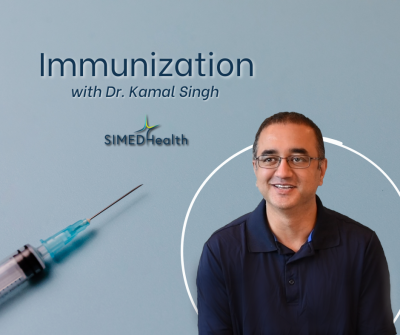
Classes resume for fall semester, and the flu season is right behind it. August is Immunization Awareness Month and we heard from Dr. Kamal Singh about vaccines.
Vaccines train the body to fight an invasion without developing significant illness. When the body is exposed to foreign pathogens, such as viruses or bacteria, the immune system produces antibodies allowing it to defend itself. “These antibodies attack the invading pathogens, also known as an antigens, and protect against further infection”, says Dr. Kamal Singh, a SIMEDHealth Primary Care Internal Medicine physician.
When facing the invader for the first time, there is a delay of sometimes days between the body’s exposure to the invader (antigen) and developing the antibody attack response. “For severe antigens like the measles virus or the Pertussis whopping cough bacteria, a few days delay is too long”, emphasizes Dr. Singh. “The infection can rapidly spread throughout the body, before the immune system can fight back. Unfortunately, this delay can sometimes result in death.”
Every year millions of healthy adults and children are given vaccines to prevent serious diseases. In the United States available vaccines go through many years of rigorous testing prior to being made available to the public, including:
- Multiple levels of clinical trials determining the vaccine’s effectiveness, tolerability and safety.
- Food and Drug Administration (FDA) evaluation and review of the data, and upon the FDA’s approval, the Centers for Disease Control and Prevention (CDC) must go through its own evaluation, review and approval process.
- Infants, children, adults, and senior citizens are evaluated and reviewed separately, as are males, females, and more recently ethnicity, race, and social determinants of health to best determine the vaccine’s effect, tolerance, and safety in these subgroups.
- Even after FDA and CDC approval, the vaccine production facility continues to submit reports to the FDA on the quality and safety of the vaccine, to ensure the vaccine continues to meets the required standards.
“The U.S. has one of the most advanced systems in the world for tracking vaccine safety”, says Dr. Singh.
Many people, especially new parents can be overwhelmed with keeping up with immunizations. Dr. Singh reports, "Vaccine schedules have been developed by the CDC, the American Academy of Pediatrics, and the American Academy of Family Physicians covering all current vaccine guidelines." Vaccinations keep you, your family, and others safe from potentially deadly diseases by significantly decreasing or eliminating the severity and spread of disease.
Some vaccines have precautions associated with them. “ Dr. Singh explains, “these are things which may happen in some subgroups of people, however the benefit of receiving the vaccine may still outweigh the precaution consequences, and the vaccine can be received. A contraindication, however is a very specific situation in which the vaccine will likely result in more harm to the person, than the benefit expected to be received.” He continues, “while all vaccines have precautions and contraindications, they are usually only applicable to a very small number of people, and vaccines overall are generally very well tolerated. Some precautions and contraindications are only for very brief periods of time, and the vaccination can safely be received once the period has lapsed”
If you have questions about vaccines and the appropriate vaccine schedule for you or your loved one, contact your Primary Care physician or advanced care provider who can discuss the details with you.